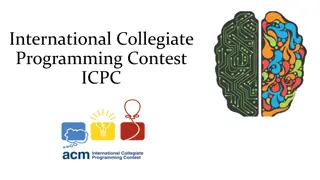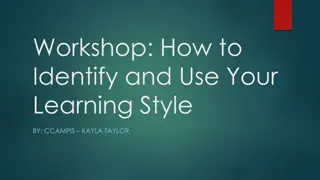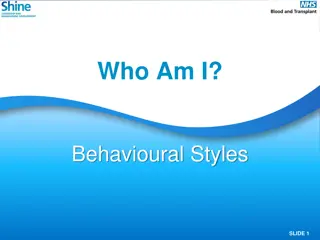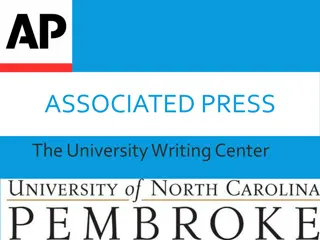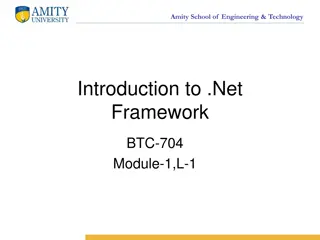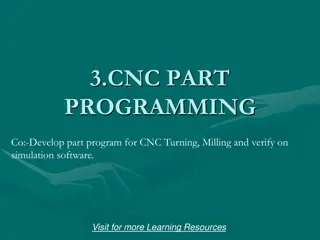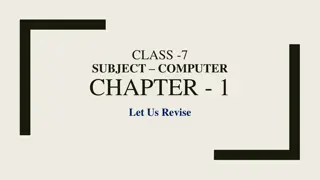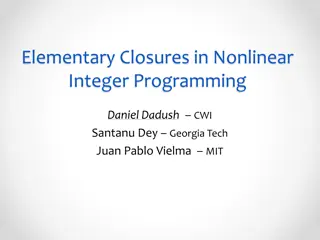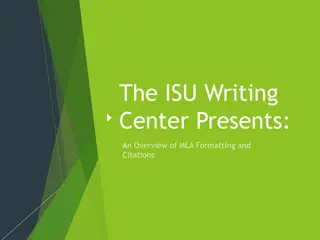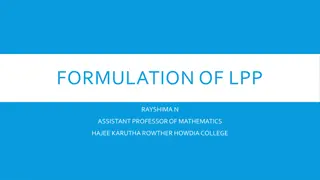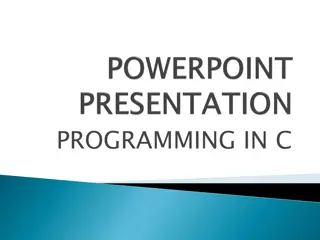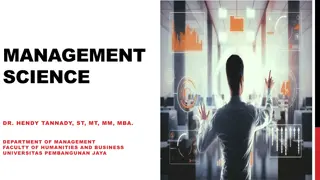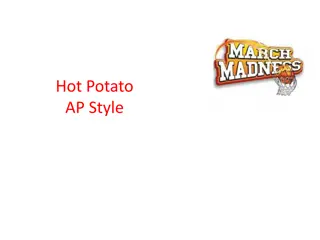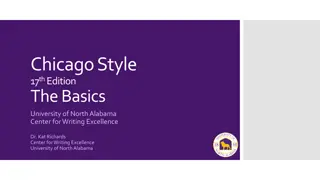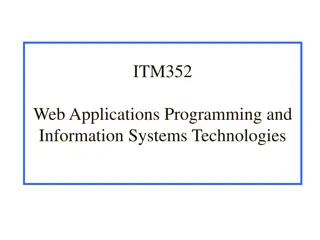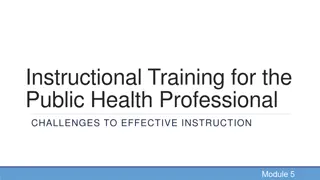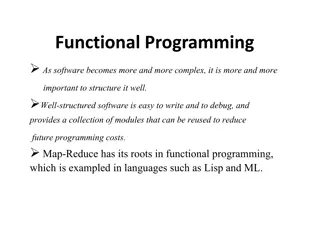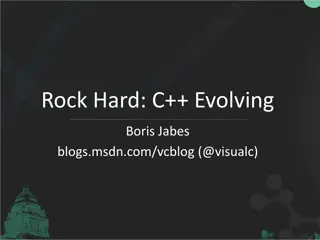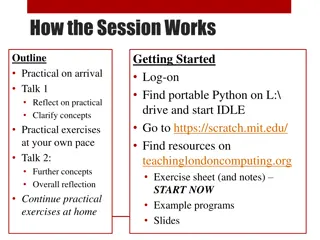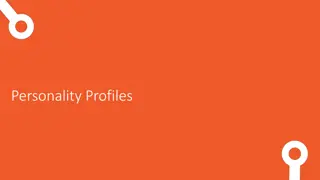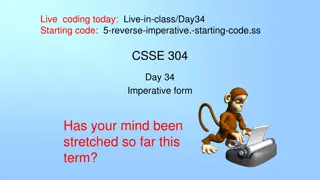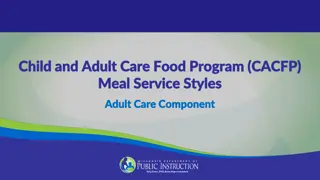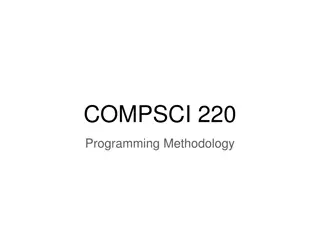Functional Programming
Functional programming, a paradigm that emphasizes declarative programming, pure functions, and limited side effects. Explore the benefits and characteristics of functional programming languages.
0 views • 20 slides
Improving Academic Writing: Key Aspects of Academic Style and Referencing
Learn about academic style in English, principles of referencing, and how to write effectively for assignments. Understand the functions of academic style, such as clear communication and showcasing membership in the academic community. Explore a paragraph analysis on making people work harder, iden
0 views • 29 slides
Programming in C: Overview and Constants Explanation
Programming in C is a fundamental introductory guide to the C programming language. It covers the basics of C, including its development history, character set, constants, and rules for constructing constants like integer and real constants. Dr. M. A. JAMAL MOHAMED YASEEN ZUBEIR, an Assistant Profes
4 views • 33 slides
International Collegiate Programming Contest (ICPC) Overview and Rules
The International Collegiate Programming Contest (ICPC) is a prestigious global competition in competitive programming supported by major tech companies like Google and Facebook. Participants tackle logical and mathematical problems by developing efficient algorithms and implementing them in various
5 views • 17 slides
Unlock Your Learning Style Potential
Discover how to identify and utilize your unique learning style effectively with this workshop led by Kayla Taylor. Learn about the different learning styles, take a quiz to find yours, and understand how to integrate your style into your daily life. Knowing your learning style can enhance academic
0 views • 9 slides
Behavioural Styles: The Analyst (Technician)
Explore the concept of behavioural styles introduced by David Merrill and Roger Reid in the 1960s, focusing on the Analyst style. This style embodies traits such as organization, setting long-term goals, high standards, duty, analysis, directness, decision-making, task-oriented focus, risk-taking, a
2 views • 28 slides
Essential Guidelines for AP Style: Writing Tips and Techniques
Writing in AP style requires adherence to specific guidelines including consistency, clarity, accuracy, and brevity. This writing style follows the inverted pyramid format, focusing on conveying information in a concise and direct manner. The structure emphasizes getting straight to the point, with
4 views • 23 slides
Decision Analysis and Operations Research in Management
This content delves into Management Decision Analysis and Operations Research techniques such as Linear Programming, Integer Linear Programming, Dynamic Programming, Nonlinear Programming, and Network Programming. It covers the phases of an Operations Research study, mathematical modeling for decisi
0 views • 36 slides
Introduction to Amity School of Engineering & Technology
Amity School of Engineering & Technology offers courses in .NET Framework, Windows GUI development, C/C++ programming, Visual Basic, and Java/J2EE programming. The curriculum covers topics such as Win32 API, MFC, object-oriented programming, and web development. Students learn to develop application
1 views • 14 slides
Module 2: PSEA and Safe Programming Training of Trainers (ToT) by CRS HRD
This Module 2 focuses on PSEA and Safe Programming, covering key sessions on understanding safe programming, identifying protection and SEA risks, and mitigating risks. It emphasizes the importance of safe programming in increasing safety, dignity, and access, with staff playing a crucial role. Part
3 views • 19 slides
Comprehensive Guide to CNC Part Programming
Learn about CNC part programming for turning and milling machines. Understand the importance of part programs, program input devices, machine control unit functions, and CNC programming methods like offline and conversational programming. Explore the Cartesian coordinate system, tool positioning, an
0 views • 61 slides
Computer Programming: Basics and Beyond
In this chapter, we delve into the fundamental concepts of computer programming. We explore the definition of a program, the role of programming languages, types of programming languages, and generations of programming languages. Additionally, an assignment is provided to reinforce the key learnings
0 views • 25 slides
Advances in Integer Linear Programming and Closure Techniques
Explore cutting planes, convex integer programming, Chvátal-Gomory cuts, and closure methods in nonlinear integer programming. Discover how these techniques enhance the efficiency and effectiveness of integer programming models, leading to substantial progress and improved solutions.
1 views • 40 slides
Mastering MLA Style: A Comprehensive Guide
The presentation by the ISU Writing Center covers the essentials of MLA style, including what MLA is, how to format papers, create in-text citations and Works Cited pages. It explains the overview of MLA style, why it is used, and the general rules to follow. Detailed information on creating headers
4 views • 19 slides
Object-Oriented Programming (OOP) in Python
Python is a versatile programming language that supports various programming approaches. Object-Oriented Programming (OOP) is a popular method in Python where objects are created to solve programming problems. OOP in Python focuses on creating reusable code, following the principle of DRY (Don't Rep
2 views • 35 slides
Formulation of Linear Programming Problems in Decision Making
Linear Programming is a mathematical technique used to optimize resource allocation and achieve specific objectives in decision-making. The nature of Linear Programming problems includes product-mix and blending problems, with components like decision variables and constraints. Various terminologies
1 views • 14 slides
Introduction to Computers and C++ Programming Lecture 1 - Overview and Basics
This lecture covers the fundamental concepts in computer systems and programming using C++. Topics include the main components of a computer, bytes and addresses in memory, computer systems hardware and software, understanding programs, programming languages, compilers, preparing and running C++ pro
2 views • 21 slides
Introduction to Programming in C Language
C language is a procedural programming language developed by Dennis Ritchie in 1972. Known for its low-level access to memory, simple keyword set, and clean style, C is ideal for system programming tasks like operating system and compiler development. This article covers key aspects of C language, P
0 views • 12 slides
Linear Programming: A Tool for Optimizing Business Operations
Explore the application of linear programming in business, as exemplified by the case study of San Miguel Corporation. Learn how linear programming models can help maximize profits, optimize resource allocation, and streamline decision-making processes in various industries. Discover the fundamental
1 views • 19 slides
Web Application Development and Programming CTE Program Overview
Viera High School offers a comprehensive CTE program in Web Application Development and Programming, taught by Mr. Dohmen. Students learn popular programming languages like Python, SQL, JavaScript, Java, C#, and C. The courses cover web programming, JavaScripting, and PHP programming, providing cert
3 views • 7 slides
Introduction to Programming with RobotC in Robotics Education
Programming in robotics involves giving specific directions to a robot using software like RobotC. This introduction covers the basics of programming, software organization, and how to get started with RobotC through creating flow charts and programming tasks. Learn about setting up RobotC, creating
1 views • 8 slides
Introduction to Programming and Computer Instructions
Programming is the process of creating instructions for computers to follow and accomplish tasks. It involves turning human language instructions into detailed binary machine language. Before learning programming, individuals may have different levels of experience, ranging from no experience to pro
0 views • 16 slides
AP Style Writing Examples & Images
Explore examples of AP style writing in the form of sentences and images, covering topics like political figures, sports events, and journalistic experiences. Each sentence presents variations in punctuation and style following AP guidelines, accompanied by corresponding high-quality images. Practic
2 views • 61 slides
Functional Styles in Language
The notion of style is explored in language use, including variations in literary and non-literary contexts, register linguistic features, and style-shifting according to formality. Definitions and classifications of style emphasize the distinctive features characteristic of register, genre, or auth
0 views • 30 slides
Chicago Style: A Comprehensive Guide
Chicago Style, established in 1906, is a widely used citation style in academia, providing guidelines for various disciplines. This guide covers the basics of Chicago Style, including its importance, recommended subtypes, formatting requirements, and more.
0 views • 39 slides
Development of Attosecond Theory for Nobel Prize through Verilog Programming
Attosecond generation is a crucial technique for creating attosecond pulses by manipulating radiation waves. This research paper focuses on developing the Attosecond generation equation through Verilog programming and validating it using test programming techniques. The interface between equations,
2 views • 15 slides
CS252 Systems Programming Course Overview
This course overview covers topics such as C programming review, Unix basics, Unix systems programming, and grading details. The course includes labs on C/C++ programming, Unix shell scripting, and writing your own shell. Communication is emphasized through Piazza for questions/answers and Blackboar
0 views • 41 slides
Introduction to Programming Languages and Functional Programming with OCaml
Welcome to Lecture 1 of CSEP505 on Programming Languages focusing on OCaml and functional programming. Professor Dan Grossman introduces the course, discusses the importance of studying programming languages, and shares insights on course mechanics and content. Topics include staff introductions, co
1 views • 84 slides
ITM352 and Its Role in MIS
Welcome to ITM352, a course focusing on acquiring basic programming skills in a business context. This course emphasizes hands-on experience in developing relevant software applications, addressing real technology problems, and fostering rapid self-learning of IS/IT technologies. Misconceptions arou
0 views • 36 slides
Effective Instructional Training Strategies for Public Health Professionals
This instructional training module focuses on identifying challenges to effective instruction in public health settings and provides methods and tactics to overcome them. It covers topics such as recognizing physical challenges, arranging optimal learning environments, addressing participant/learner
0 views • 14 slides
Functional Programming Paradigm
Functional programming emphasizes well-structured software that is easy to write and debug, with reusable modules to reduce future programming costs. It introduces higher-order functions and first-class function values, fostering declarative programming for tasks like symbolic data manipulation and
0 views • 21 slides
Essential Principles of Teaching Programming Languages
Foundational concepts in programming form the core of computing. This encompasses understanding programming fundamentals, teaching language aspects effectively, statistical programming for data analysis, and guiding students unfamiliar with programming environments towards grasping the logic and sim
0 views • 23 slides
Computer Programming Principles
Dive into the world of computer programming, covering high-level and machine languages, compilers, interpreters, writing programs, top-down design, and the array of programming languages available. Understand the essentials of building code to control computers, the diversity of programming language
0 views • 23 slides
Evolution of C++: Power and Performance in Programming
Explore the evolution of C++ from C++0x to C++11, focusing on power and performance on any platform with a higher-level style of programming. Understand the efficiency of programming with values and the importance of deep copying. Dive into the world of C++ development and learn how to leverage its
0 views • 31 slides
Transitioning from Scratch to Python: A Practical Approach for Learning Textual Programming
Explore the transition from visual programming in Scratch to textual programming in Python using Turtle Graphics. Engage in practical exercises, clarify key concepts, and reflect on the challenges and progress in learning core programming concepts. Utilize resources from TeachingLondon Computing to
0 views • 21 slides
The DISC Personality Profiles
The DISC model, developed by William Moulton Marston, categorizes individuals into four behavioral styles based on whether they are people-oriented or task-oriented, as well as reserved or active. The Dominant (D) style is assertive and decisive, Influential (I) style is charismatic and motivating,
0 views • 9 slides
Imperative Form in Scheme Programming
Delve into the world of imperative programming in Scheme, exploring the boundaries of C or Assembly Language resemblance. Discover how Scheme can serve as a robust language for interpreter implementation and contemplate if a simpler language without first-class procedures would suffice for Assignmen
0 views • 18 slides
Meal Service Styles in Child and Adult Care Food Program (CACFP)
Explore various meal service styles in the Child and Adult Care Food Program (CACFP), including cafeteria style, pre-plated style, family-style dining, and offer versus serve. Learn about the differences and requirements of each service style to provide nutritious meals to participants effectively.
0 views • 14 slides
CS 288-102 Intensive Programming in Linux Spring 2017 Course Details
Learn Linux programming, C language proficiency, Bash scripting, and more in this intensive course taught by Instructor C.F. Yurkoski. The course covers programming in Linux environment, command line interface, C language, client/server programming, and essential programming concepts like pointers,
0 views • 31 slides
Functional Programming Concepts for COMPSCI 220 Programming Methodology
In this tutorial, we explore functional programming concepts in the context of COMPSCI 220 Programming Methodology. We delve into writing functions using `reduce` and discuss examples and implementations of various functions like sum, product, and string length calculation. We also analyze the diffe
1 views • 47 slides



